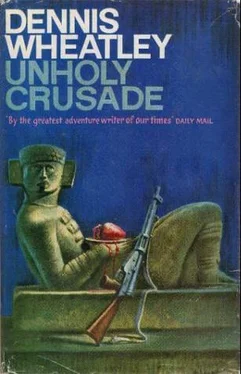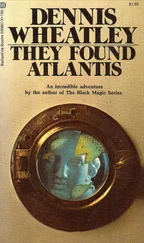Yet here he was, unquestionably awake and, for all practical purposes, a prisoner in this gloomy monastic house. The association with religion brought his thoughts back to Alberuque. Ordained though he must have been, he was no priest of Christ. Mentally he was still Itzechuatl, a servant of the Devil, as represented by the blood lusting gods who had for so long terrorized the unfortunate people of Mexico.
That made the movement he was leading much more understandable. The superstition ridden Indians still believed in those old gods, and sacrificed chickens and pigs to them. Many of their half breed country priests were secretly of the same persuasion and gave only lip service to the Christian God. It had needed only a dominating personality, such as Alberuque's, to imbue them with the conviction that, if they acted with resolution, they could by sheer weight of numbers seize the country and afterwards be able to bring about a return of the old days the days of human sacrifice.
If that came about, Alberuque would achieve his ambition. once more he would be a High Priest, able to glut his sadistic craving to hear the screams of his victims as he tore out their hearts and plunged his hands in their warm blood. What then? Would the United Nations take solemn notice and, after months of debate, call for sanctions, or the United States employ armed intervention? Either was possible, but unlikely. Both had sponsored this new found doctrine that all peoples were entitled to their independence which, literally interpreted, meant that they were free to persecute and kill their minorities in any way they chose. The pressure they had exerted to force the European Powers to give up their colonies prematurely had led in them to an end of justice, toleration, the liberty of the individual, security of property and life itself. Indonesia, Cambodia, India, Pakistan, Cyprus and the Congo all told the same awful tale of massacres and murder. Would Americans then kill their own `sacred cow' and intervene in Mexico? Even if at long last they did, it would not be before many thousands of people had lost their lives in a ghastly civil war.
Judging that the half hour was up, Adam went downstairs again. The library was empty and he browsed there, seeking some work that would distract his mind from his worries. Nearly all the books were in Spanish and on religious subjects; but at length he came upon a row of tall atlases, some of which dated back to the seventeenth century, and he flicked over their pages until he was brought his meagre lunch.
Afterwards he went out into the garden. It was ill cared for, the paths overgrown with weeds, but it was a good acre in extent and surrounded by high walls. At the far end there stood a big barn and, finding the door unlocked, he went inside. To his surprise, it housed a helicopter capable of carrying four people. The machine formed a strange contrast to the other contents of the barn: an ancient wagon, two dusty carriages dating from Victorian times, old agricultural implements and, in a half loft above, some bales of hay.
For a moment he was seized with the wild idea that he might use the helicopter to escape to fly right out of Mexico down to Guatemala. But he had never flown an aircraft of any kind, so recognised his thought to be a pipe dream. Besides, on second thoughts even if he could have flown it and it was capable of covering such a distance, he would not have made the attempt. For better or worse, he considered himself committed now to remain there and do his damnedest to wreck Alberuque's schemes.
But how? All the afternoon he paced up and down the garden exploring possibilities. One thing was clear: he dared not communicate with Ramon or the police. If he had been able to go to them with the names of several Bishops and evidence that they were involved in the conspiracy, or an account of Alberuque's plans and the date he intended to set the revolution in motion, he would have gambled on their believing him and, at all events until matters developed, affording him protective custody.
To go to them empty handed was a very different matter. They had clearly believed him guilty in the Uxmal affair and had given him the benefit of the doubt only because there was a chance that they might gain some useful information by doing so. Now, after the massacre at the prison, obviously staged to get him out, he must be Number One on their wanted list. They would never believe him to be innocent. They would assume that he had come to them only because he had belatedly decided that Alberuque's coup would fail; so was now endeavouring to put himself in the clear while there was still time. Even if they kept him on ice for the time being, once Alberuque's account of how he had strangled the warder reached them, his goose would be cooked.
He could think of only one possible life line: `Uncle' Jeremy Hunterscombe. Whatever he was supposed to have done, Hunterscombe would not turn him over to the police. He might provide help or, at all events, sound advice on how to get the better of Alberuque. And later, when Adam had to face a police enquiry, the Wing Commander would be able to vouch for it that he had done his utmost to sabotage the conspiracy.
During the course of the day, Adam had seen, in addition to the skull faced lay brother who appeared to be in charge of him, several monks, as well as four Indian hoodlums who lurked about the place, presumably as guardians; so, after spending a long, dreary evening, he still had to struggle to keep awake for several
hours until he could be reasonably certain that the inmates of the house were asleep.
Although he still had no accurate means of telling the time, he judged it to be about one o'clock in the morning when he got out of bed, dressed himself and prepared to leave the building. To have gone downstairs would have been to risk discovery, and the last thing he wanted was for Alberuque to learn that he had attempted to escape or communicate with friends outside. But the door of his room had not been locked, and in the ceiling of the landing on to which it led he had noticed a trapdoor that was obviously a way up to the roof.
Owing to his unusual height, by standing on tiptoe he was able to reach it and, after several failures, succeeded in throwing the trap back. A good spring then enabled him to grasp a rim of the aperture and a moment later he had wriggled himself out into the cool night air.
Then ten minutes that followed were fraught with difficulties and dangers, but his strength and reach enabled him to overcome them. Lowering himself from one precarious hold to another, he succeeded in reaching the ground safely. Still undetected, he tiptoed down the drive and out into the high walled, cobbled street.
So far, so good; but he now had to get to Hunterscombe's apartment, which presented quite a problem, for he had no money and not the faintest idea where he was. As the street was on a slope, he set off downhill and after only five minutes' walk had a lucky break. It ended in an irregular, open space, on one side of which stood a big building blazing with lights, and in front of it were parked thirty or forty cars. After a moment he recognised it as the once great monastery and now de luxe restaurant of San Angel.
That gave him his bearings but cause for dismay, as he recalled that this ancient suburb lay about seven miles from the centre of Mexico City. For several minutes he stood in the shadow of some all trees, listening to the strains of dance music coming from the restaurant, while he wondered what to do. From time to time cars would be leaving, so he could beg a lift; but it was certain that his description would have been circulated by the police. His height, coupled with his red gold hair and beard, were a sure give away; so he decided that he dared not risk it and must walk.
After two false starts, he found the six lane motorway and put its best foot forward. Presently he came to a lighted clock tower and saw that it was only twenty five minutes to one; so he had Overestimated the time he had lain waiting and must have left the house shortly after midnight. But that was now all to the good.
Читать дальше












